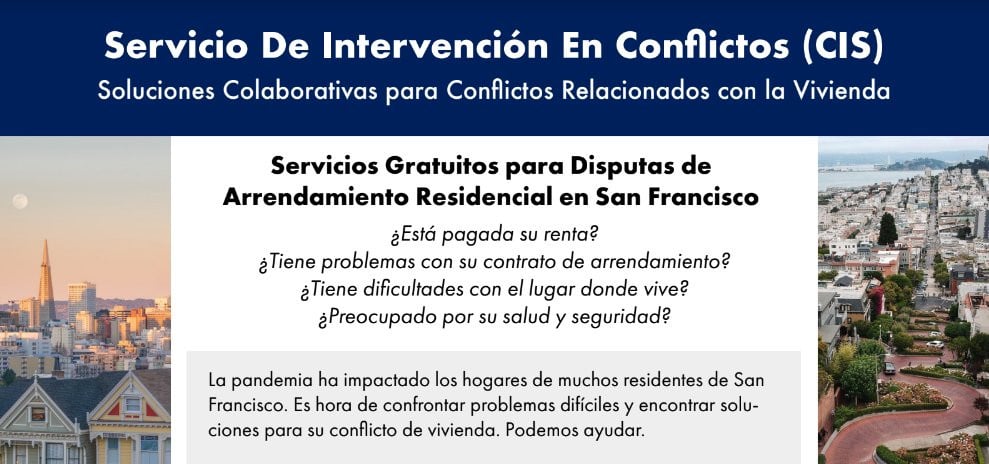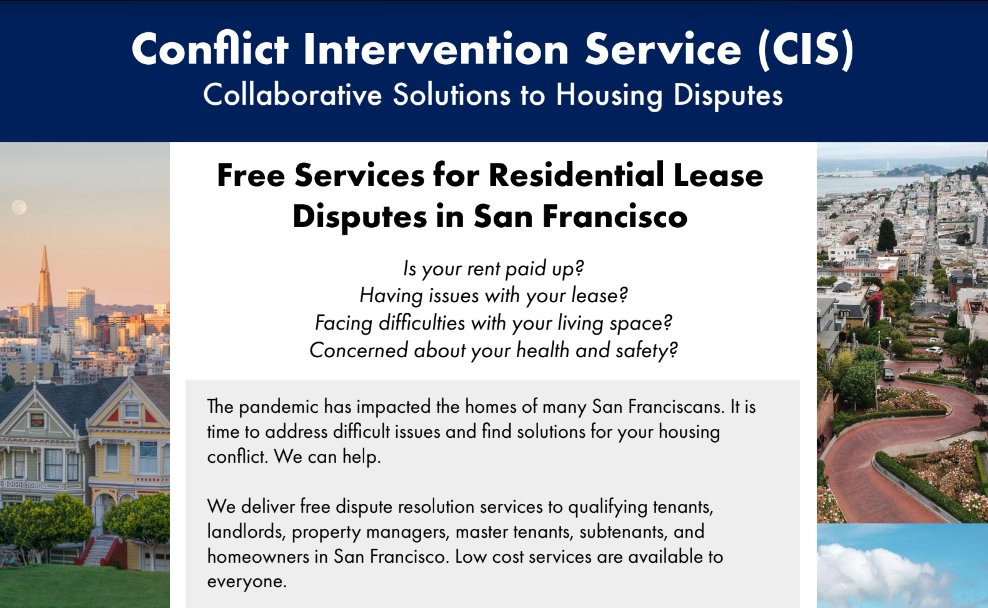(العربية)
This memorandum is primarily for service providers, and outlines the updated procedure for asserting a tenant’s rights under the recent eviction moratorium. We have reproduced it in its entirety. A copy of the original is here: https://bit.ly/2V6EOMx
We have highlighted in red an importance sentence. If you need assistance asserting this right, please confidentially email our coalition at info@lptlc.org.
Mayor’s Office of Housing and Community Development City and County of San Francisco
London N. Breed Mayor
Daniel Adams Acting Director
Temporary Moratoriums on Residential Evictions
Rules and Regulations for Tenants and Landlords
Updated April 14, 2020
SUSPENSION OF EVICTIONS: On March 23, 2020, the Mayor ordered that no landlord may attempt to recover possession of a residential unit unless due to violence, threats of violence, or health and safety issues. The Order is set to expire on April 22, 2020 (the “Expiration Date”), unless the Mayor extends the Expiration Date further. This rule will last for two months after the Order’s Expiration Date. If a landlord wishes to serve an eviction notice for the tenant to vacate after this rule is no longer in effect, they must include Form 1010 (Notice to Tenant Regarding the Existence of a Temporary Eviction Moratorium due to COVID-19) prepared by the San Francisco Rent Board. The form can be found on the Rent Board’s website (www.sfrb.org). Additional rules for three-day notices for non-payment of rent are provided below.
NEW RULES FOR MISSED RENT PAYMENTS: The March 23 Order establishes that there is no just cause to evict a tenant who has missed a rent payment as a result of the financial impacts of the COVID-19 crisis, with respect to any payment missed between March 13, 2020 and the Order’s Expiration Date (currently April 22, 2020), until six months after the Order’s Expiration Date (currently October 22, 2020). If the Mayor extends the Expiration Date, these Rules and Regulations shall be extended as well. These protections against evictions may not be waived and any written or oral waiver by the tenant shall not be enforceable. However, landlords may allow tenants more time to comply with these rules and may allow more than six months after the Order’s Expiration Date to become current on any missed rent payment(s).
-
- A. NOTICE
THE TENANT MUST NOTIFY THE LANDLORD THAT THE TENANT WAS UNABLE TO PAY RENT DUE TO FINANCIAL IMPACTS OF COVID-19, EACH TIME THE TENANT MISSES A RENT PAYMENT, WITHIN ONE MONTH AFTER THE DATE THE RENT WAS DUE.- The tenant MUST provide notice, EVEN IF the landlord has not alerted them of the missed payment, for EACH rent payment that they miss prior to the Order’s Expiration Date.
- It is advisable, though not required, for the tenant to provide notice in writing.
- The tenant must give the notice to the landlord, or to whomever normally acts on the landlord’s behalf with respect to the collection of rent (e.g., a property manager). The notice is due within ONE MONTH AFTER the date the rent was due. The date rent is due is considered to be the monthly date parties have established as a matter of habit. For example, if the lease agreement indicates rent is due on the first of the month, but the longstanding pattern has been the seventh of the month, then the seventh of the month is considered to be the date rent is due.
- The tenant may submit documentation of a financial impact along with the notice.
- A landlord may extend or waive any deadline to receive notice.
- A. NOTICE
-
- B. DOCUMENTATION
THE TENANT MUST PROVIDE THE LANDLORD DOCUMENTATION TO SUPPORT THEIR CLAIM THAT THEY MISSED THE RENT PAYMENT DUE TO FINANCIAL IMPACTS OF COVID-19, NO LATER THAN ONE WEEK AFTER THE DEADLINE TO PROVIDE THE NOTICE.- A tenant may satisfy this requirement with a letter, email, or other communication written by the tenant that explains the financial impact they are experiencing. The explanation should be objectively verifiable and focused on substantial loss of household income. Third-party documentation is NOT necessary to satisfy this step and is at the sole discretion of the tenant to provide, but tenants may provide such documents, if they choose to and if available, such as a letter from their employer, proof of Unemployment Insurance claim filing, or other relevant documents. This documentation and other documentation maintained by the tenant may be used for a tenant’s affirmative defense, in the event a landlord files an eviction lawsuit.
- The tenant may submit documentation of a financial impact along with the notice. If the tenant provides notice in writing and it explains the financial impact they are experiencing as set forth above, then such combined notice and documentation shall be deemed as complying with the requirements of Rules A and B.
- “Financial impacts” means a substantial loss of household income due to business closure, loss of compensable hours of work or wages, layoffs, or increased expenses related to COVID-19.
- As noted above, the tenant must provide documentation for each rent payment they miss.
- If the tenant has provided documentation as set forth above, then for purposes of evictions, the rent shall not be due until six months after the Order’s Expiration Date (currently October 22, 2020). The tenant should pay sooner if able to do so, and if the tenant has not paid within one month after the deadline for providing the documentation, the landlord should send the tenant a written reminder of the initial extension and the parties should begin discussing a payment plan, as set forth below (Rule C).
- A landlord may extend or waive any deadline to submit documentation or pay missed rent.
- B. DOCUMENTATION
-
- C. SIX-MONTH PAYMENT PLAN
- A payment plan may waive portions of what the tenant owes, and may grant the tenant additional time to pay beyond the minimum requirements of the Order. If the parties do not agree on a payment plan, then under the Order, the landlord may have just cause to evict the tenant based on the unpaid amounts as soon as those amounts are due, which is no sooner than six months after the Order’s Expiration Date (currently October 22).
- The landlord should send the tenant a written reminder of the initial extension and parties should begin discussing a payment plan for each missed rent payment as noted in Rule B and in the bullet point above.
- A landlord shall apply payments according to when the rent is due under these rules. For example, if a tenant has missed an April rent payment and has complied with the notice and documentation requirements, then such missed rent is due no sooner than October 22, 2020. Thus, if rent is due on the first of the month, a payment received on May 1 would be applied to the May rent. The landlord may not apply the payment to the April rent and claim that the May rent is still unpaid.
- The landlord shall not condition a payment plan on changes to lease terms.
- The landlord may provide the tenant additional time under a payment plan. However, a tenant’s failure to comply with a payment plan prior to the six-month mark is not just cause to evict. Similarly, a landlord may request follow-up documentation of the tenant’s inability to pay during the six-month period, to inform negotiations with the tenant, but a tenant’s failure to respond to a follow-up request for documentation is not just cause to evict.
- C. SIX-MONTH PAYMENT PLAN
- APPLICABILITY
- These rules apply to all units subject to the Rent Ordinance (including single-family homes and units constructed after 1979), as well as units where the rent is controlled or regulated by the City (including privately held units regulated by the Mayor’s Office of Housing and Community Development or the Department of Homelessness and Supportive Housing).
- These rules apply to any payments that a tenant may owe to a landlord, including payments under existing stipulations/payment plans for back rent, and including any late fees, security deposit, interest or similar amounts that a landlord may be authorized to charge due to delayed or missed payments under the express terms of a lease. Landlords are highly encouraged to waive late fees and interest for missed rent payments due to financial impacts of COVID-19.
- As used herein, the term “landlord” includes, without limitation, master tenants or any individual who has the right to recover possession of a residential unit. The term “tenant” includes master tenants, a subtenant, or any other individual who has the right to possess all or a portion of a residential unit.
- Notwithstanding Administrative Code Section 37.9(b), if a landlord resides in the same rental unit with their tenant, and the landlord attempts to evict after the tenant failed to pay rent, it shall be rebuttably presumed that the eviction is due to the non-payment and the eviction shall be subject to these rules, unless and until the landlord can demonstrate an alternative, non-pretextual reason for recovering possession (e.g., turning the unit over to a new tenant under a previously executed agreement, previously executed agreement to deliver premises vacant to a new owner, planned renovations).
Information & Resources
For additional tenant assistance, please contact Housing Rights Committee of San Francisco at 415- 703-8644, Chinatown Community Development Center at 415-984-2728, San Francisco Tenants Union at 415-282-6622, or visit the San Francisco Anti-Displacement Coalition’s website: www.sfadc.org.
For additional landlord assistance, please contact San Francisco Apartment Association at 415-255- 2288.
For mediation services, tenants or landlords may contact the Bar Association of San Francisco helpline at 415-782-8940 or cis@sfbar.org.
For more information, visit our website and check back regularly for updates: https://sf.gov/information/about-eviction-moratorium-residents-due-covid-19. For general information, contact the Mayor’s Office of Housing and Community Development at eviction.moratorium@sfgov.org or visit the San Francisco Rent Board’s website: www.sfrb.org.
v03_20200413







